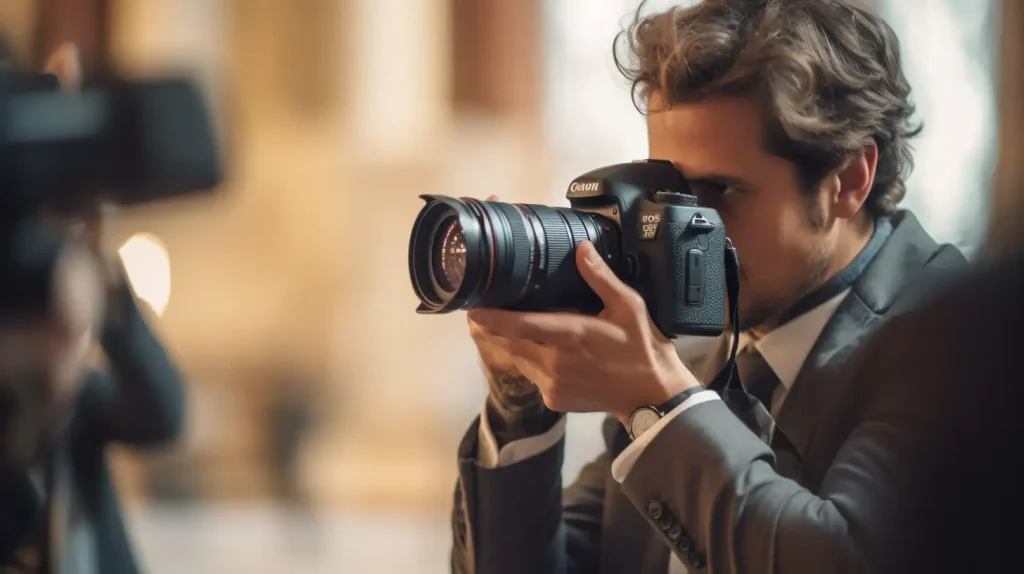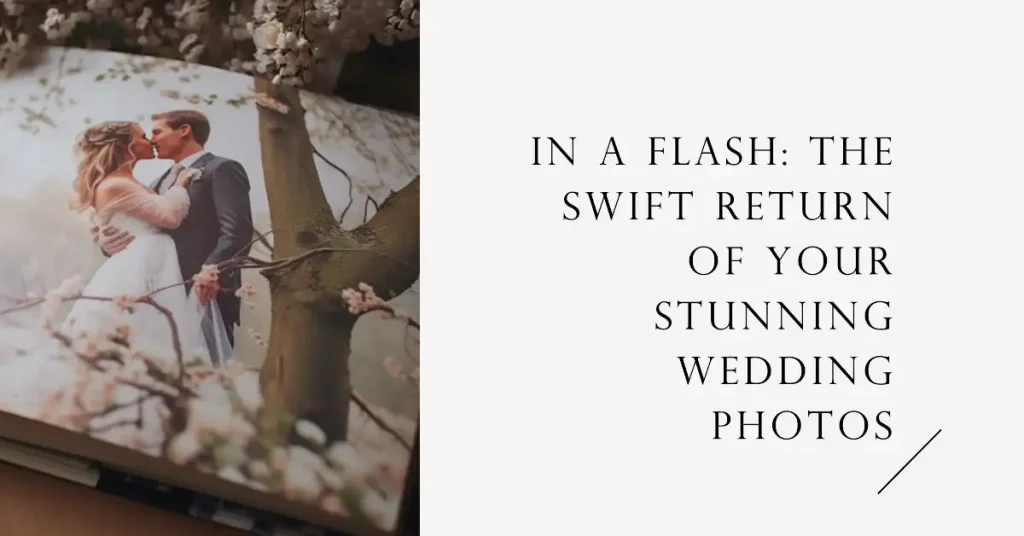Table of Contents
Wedding photographers’ earnings vary significantly depending on factors such as location, experience, and the type of services offered. On average, they can earn anywhere from $2,500 to $10,000 per wedding, with some top professionals charging even higher fees for their exceptional skills and services.
Imagine this: you’re standing amidst a bustling crowd, camera in hand, eyes scanning the surroundings for the perfect shot. You’re not just an observer but a key player in creating memories that last a lifetime. Welcome to the world of wedding photography. Let’s explore how this magical profession translates into monetary value and what factors influence these numbers.
The Artistry and Skill of Wedding Photography
In the vast world of photography, wedding photography holds a special place. It requires more than just an artistic eye; it demands a host of other skills that blend to create the perfect wedding album. Let’s pull back the curtain and discover what truly powers this beautiful profession.
- Carter, Lisa (Author)
- English (Publication Language)
- 107 Pages - 04/06/2024 (Publication Date) - Independently published (Publisher)
Mastering the Technical
A wedding photographer is a master of their craft, an expert in harnessing the potential of their equipment. They know their camera like the back of their hand, understanding its intricate workings, and exploiting its capabilities to the fullest. They command the technical jargon – ISO, aperture, shutter speed, focus, and more, adjusting these settings on-the-go to get the perfect shot. And it’s not just about the camera; they proficiently use different lenses, lights, and accessories to frame each moment flawlessly.
Navigating the Challenges
An essential part of the skill set of a wedding photographer is adaptability. They face unpredictable situations, ranging from changing lighting conditions to moving subjects, and even unexpected weather. Yet, their ability to swiftly navigate these challenges helps them capture stunning photos, no matter what comes their way.
Editing Expertise
Post-processing is another critical skill in a wedding photographer’s toolbox. It’s where the magic truly comes to life. They expertly manipulate contrast, saturation, sharpness, and other parameters, giving each photo a polished finish. Moreover, their skill in retouching helps highlight the beauty of the moment while keeping the image natural and authentic.
Unleashing the Creativity
Despite the technical prowess, a wedding photographer’s work transcends the realm of the tangible; it’s deeply rooted in creativity and storytelling.
The Art of Storytelling
Imagine a story without words, where each frame tells a tale. That’s what wedding photographers do – they weave narratives of love, joy, and celebration. Each image they capture is a chapter of this beautiful story, encapsulating the emotions and moments that define the couple’s big day.
Crafting Unique Styles
Every photographer has their unique style, their creative signature. It could be the way they play with light and shadows, their knack for capturing candid moments, or their distinct color grading style. This creative flair sets them apart, making each wedding album a one-of-a-kind masterpiece.
Understanding Emotions
Beyond the technical and the creative, there lies a subtler art in wedding photography – understanding emotions. A photographer tunes into the myriad of feelings that play out during a wedding – the joy, the nervous anticipation, the teary-eyed parents, the exuberant friends. Capturing these raw, heartfelt moments is what truly elevates their work from a collection of photos to a treasure trove of memories.

Factors Determining Wedding Photographer’s Earnings
Wedding photography, like any profession, comes with a range of income levels. But what drives this variation? Why do some photographers charge more than others? Several factors come into play, each contributing to the final price tag.
Geographic Location: Why It Matters
Just as the cost of living varies from place to place, so do the rates for wedding photography. If you’re operating in bustling metropolitan areas, or cities known for their extravagant weddings, you can expect higher pay. Demand is a key factor here. In these locations, clients are often willing to spend more on photography services to ensure that their big day is captured flawlessly.
The Influence of Experience and Reputation
In the world of wedding photography, your experience and reputation precede you. As you journey through your career, honing your skills, and earning accolades, your worth grows. Seasoned photographers with a proven track record can command higher prices. Their portfolio, testimonials, and word-of-mouth referrals serve as powerful tools to attract premium clients.
The Impact of Specialization and Unique Styles
In any creative field, uniqueness is a precious commodity. Wedding photographers are no exception. Those who have carved out a unique style or specialized in a certain niche often stand out in the crowd. This could be anything from vintage photography, destination weddings, or candid photojournalism. When clients seek these unique styles or specializations, they’re often ready to pay a premium for it.
The Role of Package and Service Options
Last but not least, what you offer in your photography package significantly influences your earnings. Some photographers provide a comprehensive package, including pre-wedding shoots, engagement photos, full-day wedding coverage, and premium wedding albums. Others might offer a la carte services, allowing clients to customize based on their needs and budget.
Some photographers also offer additional services such as drone photography, next-day edits, or photo booths. These additional options not only provide an enhanced service to the clients but also serve as an opportunity to increase earnings.
A Closer Look at Wedding Photography Earnings: By the Numbers
Understanding the earnings of a wedding photographer calls for a look at the numbers. While they can vary greatly due to numerous factors, they do offer us valuable insights into this profession.
Earnings per Wedding: The Broad Spectrum
To give you an idea, a wedding photographer can earn anywhere from a few hundred dollars to several thousand per event. A new photographer, just starting, might charge less to build their portfolio. As they gain experience and reputation, their rates typically increase, with top professionals charging several thousand dollars per wedding.
The National Average: A Benchmark
While it’s important to note that these numbers can vary widely, as of now, the average nationwide income for wedding photographers tends to hover around the mid-thousands. This figure serves as a rough benchmark, giving us an idea of what wedding photographers generally make.
The Role of Extras: Adding Value and Income
Beyond their fees for the wedding day itself, photographers have additional avenues to boost their income. One such avenue is print sales. Many couples are willing to pay extra for a beautifully crafted wedding album, a tangible keepsake of their special day. Large, framed prints, canvas wraps, or custom thank you cards are other popular extras. These not only offer an enhanced service to the clients but also provide an additional income stream for the photographer.
The Bigger Picture: Annual Income
Considering a wedding photographer typically doesn’t shoot weddings every day of the year, it’s crucial to consider annual income for a more accurate picture. Factoring in the number of weddings per year, additional services, and potential off seasons, a successful full-time wedding photographer can make a substantial income annually.
The Business Side of Wedding Photography
As much as photography is about art and passion, it’s equally about running a business. There’s a whole array of factors that contribute to a successful photography business. From managing overhead costs to marketing effectively, let’s take a look at what it takes to navigate the business world of wedding photography.

Overhead Costs: The Unseen Expenses
Behind the lens, there’s a lot that goes on to ensure the magic happens. Key overhead costs include equipment, editing software, and insurance, among others.
- Equipment: This includes not just the camera, but also an array of lenses, lighting equipment, backup cameras, memory cards, batteries, and more.
- Editing Software: To bring their creative vision to life in post-processing, photographers need professional editing software like Adobe Lightroom and Photoshop.
- Insurance: This is an essential, often overlooked, aspect of running a photography business. It safeguards the photographer’s expensive gear and also provides liability coverage.
All of these costs can add up, eating into a photographer’s earnings. Therefore, managing them effectively becomes a crucial part of sustaining the business.
Marketing: Standing Out in the Crowd
In a field as competitive as wedding photography, marketing oneself effectively is key to success. This involves creating a compelling portfolio, maintaining an engaging website, harnessing the power of social media, and leveraging client testimonials for word-of-mouth referrals. Some photographers also invest in paid advertising or listing services on popular wedding websites.
Financial Management: Planning for Rainy Days
Like any business, wedding photography has its highs and lows. There are peak wedding seasons, and then there are off-peak periods. Managing finances to navigate these fluctuations becomes crucial. This involves budgeting, planning for off-seasons, and ensuring a steady cash flow throughout the year.
The Growth Path and Potential in Wedding Photography
While wedding photography presents its share of challenges, it also offers abundant opportunities for growth and diversification. Consistently upskilling, broadening the range of services, and exploring additional income streams means photographers can amplify their earnings and carve a rewarding career path. Here’s how:
Upskilling: The Power of Continuous Learning
The world of photography is dynamic, with new techniques, equipment, and trends emerging regularly. Staying abreast of these changes and continuously upskilling allows photographers to enhance their craft and marketability. This could involve attending workshops, enrolling in online courses, or learning from industry leaders. The better the skills, the higher the value a photographer can offer, and the more they can charge for their services.
Diversifying Services: Broadening the Spectrum
Diversification is another powerful strategy to boost income. Apart from offering comprehensive wedding photography packages, photographers can venture into related fields. Pre-wedding shoots, engagement photos, bridal boudoir, or destination wedding photography are some areas to consider.
Additional Income Streams: Beyond the Wedding Day
Even outside the realm of weddings, there are various opportunities to earn. For instance, photographers can:
- Conduct Workshops: With their wealth of experience, photographers can conduct workshops or mentorship sessions for budding photographers. This not only provides an additional income stream but also positions them as experts in their field.
- Sell Prints Online: Selling prints online can be another lucrative avenue. Photographers can offer their best work for sale on their website or platforms like Etsy.
- Venture into Related Fields: Branching into other genres of photography, such as family photography, maternity shoots, or even fashion photography, can open up new avenues of income.
Behind the Scenes: A Day in the Life of a Wedding Photographer
Being a wedding photographer is about so much more than just showing up on the wedding day and pressing the shutter button. It’s a multi-faceted role that requires a blend of creativity, technical skill, and an impressive knack for organization. Let’s take a behind-the-scenes look at what a typical day might look like:
Before the Wedding: The Art of Preparation
There’s a saying that ‘success is where preparation and opportunity meet’, and that couldn’t be truer for a wedding photographer. Before the big day arrives, there’s a lot of preparation that goes into ensuring everything goes smoothly.
- Consultations and Planning: This involves meeting with the couple, understanding their vision, and planning the photography to match their expectations. It’s a crucial step in forming a rapport with the couple and laying the groundwork for a successful day.
- Location Scouting: Knowing the venue ahead of time helps a photographer plan their shots and anticipate potential challenges. This can involve anything from checking the lighting at different times of the day to identifying the best backdrops for the couple’s shots.
- Gear Preparation: Ensuring all equipment is ready and in perfect working condition is key. This includes charging batteries, cleaning lenses, and packing all necessary gear.

The Big Day: Capturing Magic
On the wedding day, the photographer’s role is both demanding and exhilarating.
- Storytelling: It’s about being at the right place at the right time, capturing not just the grand moments, but also the subtle nuances – the emotional glances, the laughter, the tears, the joy. It’s about telling a story, a love story, through the lens.
- Managing People and Time: Coordinating with the couple, the guests, and sometimes even other vendors to ensure everything runs smoothly is another crucial aspect of the day. It involves managing timelines and capturing all the important moments while ensuring everyone feels comfortable and at ease.
After the Wedding: Perfecting the Final Product
Once the wedding day ends, a new chapter of the photographer’s work begins.
- Image Selection and Editing: This is where the images come to life. The photographer selects the best shots and uses their editing skills to enhance the photos and create the final images that the couple will receive.
- Creating the Wedding Album: Crafting a beautifully presented wedding album involves selecting the best images, arranging them in a way that tells a story, and ensuring the album design matches the couple’s preferences.
Conclusion
From the artistry and skills required, through the factors influencing earnings, the business side of things, to the growth potential and daily life, we’ve taken a comprehensive journey into the world of wedding photography. It’s clear that beyond the price tag there’s an immense value that wedding photographers bring to the table. They are the magicians who can turn fleeting moments into eternal memories, a task that requires not just technical expertise, but also a deep understanding of emotions and storytelling. And as we’ve seen, this magic does not come without a cost.
But remember, each photograph a wedding photographer captures is not just about earning a paycheck. It’s a precious token of a couple’s love story, a story that will be told and retold for generations. This unique blend of artistry, dedication, and personal interaction gives the profession its true worth.
To all aspiring wedding photographers out there, it’s essential to understand that this career path is a marathon, not a sprint. Building up your portfolio, gaining recognition, and increasing your earning potential takes time. Yet, as many seasoned wedding photographers will tell you, the rewards – both monetary and personal satisfaction – are well worth the investment.
In the end, being a wedding photographer is as much about passion as it is about earnings. And if you have this passion, you have the potential to not just make a living but create a fulfilling life from it.
FAQs
Q: Do wedding photographers charge a flat fee or an hourly rate?
A: Wedding photographers typically charge a flat fee for their services rather than an hourly rate. The fee usually covers a specific duration, which includes pre-wedding preparations, the ceremony, and the reception. Additional services or extended coverage may incur extra charges.
Q: Can wedding photographers make a full-time income?
A: Yes, many wedding photographers can make a full-time income from their profession. However, it depends on various factors such as their location, the number of weddings they book, the prices they charge, and their business expenses.
Q: Is it possible to negotiate the pricing with wedding photographers?
A: In some cases, it is possible to negotiate the pricing with wedding photographers, especially if they offer customizable packages. However, keep in mind that experienced photographers with a high demand for their services may be less flexible with their pricing.
Q: How can wedding photographers increase their earning potential?
A: Wedding photographers can increase their earning potential by building a strong portfolio, offering various packages to cater to different budgets, establishing a reputable brand, expanding their network through marketing and referrals, and continuously improving their skills to deliver exceptional results.
Q: Should I hire a professional wedding photographer or rely on a friend or family member?
A: While having a friend or family member take photos at your wedding may seem cost-effective, it is often advisable to hire a professional wedding photographer. Professionals have the necessary expertise, equipment, and experience to capture the day’s special moments effectively, ensuring high-quality images that you can cherish for a lifetime.
Q: How do wedding photographers determine their prices?
A: Wedding photographers determine their prices based on various factors. These include the level of experience and expertise they bring to the table, the time and effort required to cover the event, the number of edited photos provided, the cost of equipment and maintenance, the expenses involved in running a photography business, and the prevailing market rates in their area.
Q: Can wedding photographers offer different packages?
A: Yes, many wedding photographers offer different packages to cater to the diverse needs and budgets of their clients. These packages often include variations in coverage hours, the number of photographers present, additional services like engagement shoots or photo booths, and the delivery format of the final images (digital, prints, albums, etc.).
Q: Do wedding photographers require a deposit?
A: Yes, it is common for wedding photographers to require a deposit to secure their services for a specific date. This deposit serves as a commitment from the couple and helps the photographer reserve that date exclusively for them. The deposit amount is typically a percentage of the total package price.
Q: How can couples find the right wedding photographer within their budget?
A: To find the right wedding photographer within their budget, couples can start by researching local photographers and their pricing. They can also ask for recommendations from friends or family who have recently gotten married. It’s important to review the photographer’s portfolio, read reviews, and schedule consultations to discuss pricing and package options.
Q: Is it customary to tip a wedding photographer?
A: Tipping is not mandatory for wedding photographers, but it is a gesture of appreciation for their hard work and dedication. If a couple feels that the photographer went above and beyond or exceeded their expectations, they may choose to tip them as a token of gratitude. The amount of the tip is subjective and can vary based on the couple’s budget and satisfaction with the photographer’s services.
Q: How far in advance should couples book a wedding photographer?
A: It is recommended to book a wedding photographer as soon as the wedding date is finalized. Many popular photographers are in high demand and may be booked months or even a year in advance. By booking early, couples can secure the services of their preferred photographer and have ample time for consultations and preparations.
Q: Can wedding photographers provide references or testimonials from previous clients?
A: Yes, wedding photographers are often willing to provide references or testimonials from previous clients upon request. This can give couples an insight into the photographer’s professionalism, reliability, and the overall satisfaction of past clients with their services.
Key Takeaways
- Wedding photographers’ earnings can vary depending on factors such as location, experience, and services offered.
- On average, wedding photographers can earn anywhere from $2,500 to $10,000 per wedding, with top professionals charging even higher fees.
- Wedding photography requires technical expertise, adaptability, editing skills, creativity, and storytelling abilities.
- Factors that influence a wedding photographer’s earnings include geographic location, experience, reputation, specialization, and the package and services offered.
- Wedding photographers can increase their earning potential by upskilling, diversifying services, and exploring additional income streams.
- Running a successful wedding photography business involves managing overhead costs, effective marketing, and financial planning.
- Wedding photographers can offer different packages to cater to different budgets and client needs.
- It is recommended to book a wedding photographer as soon as the wedding date is finalized to secure their services.
- Tipping wedding photographers is not mandatory but can be a gesture of appreciation for their work.
COPYRIGHT NOTICE
Please be advised that all images, designs, and creative content on this page are the exclusive property of TheIDoGuide.com and are protected under international copyright laws. The images may not be reproduced, copied, transmitted or manipulated without the written permission of TheIDoGuide.com.
Unauthorized use, distribution, display, or creation of derivative works of any images contained on this site, is strictly prohibited and can lead to legal penalties. We actively monitor for, and enforce, our copyright interests.
If you wish to use any of our images, kindly contact us to seek permission. Respect of copyright is not merely a legal requirement but also an acknowledgement and support of the hard work and creativity that goes into producing them.
Thank you for your understanding and cooperation.
© 2023, TheIDoGuide.com. All Rights Reserved.






